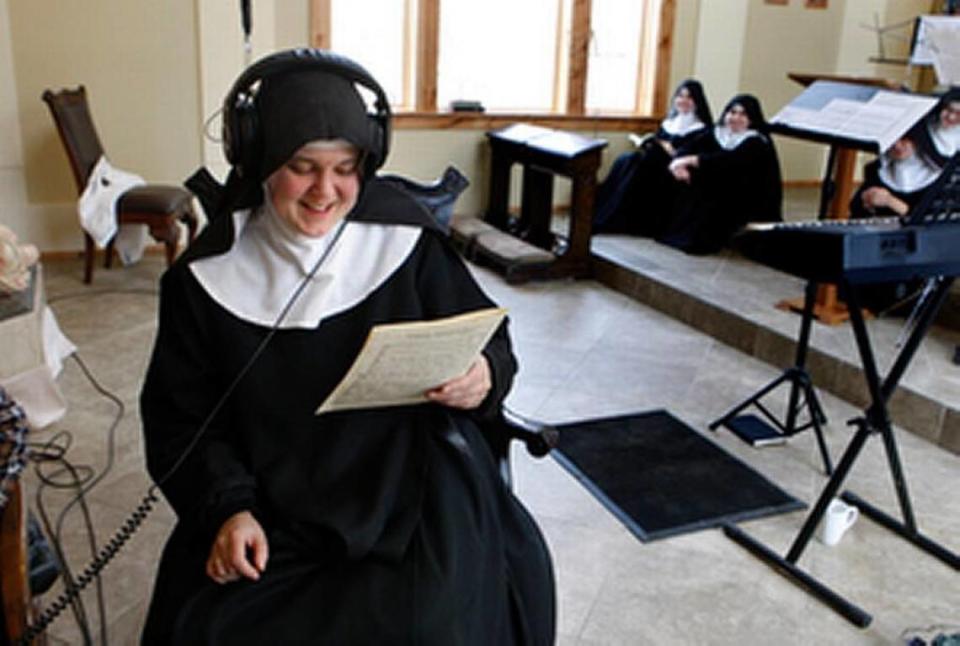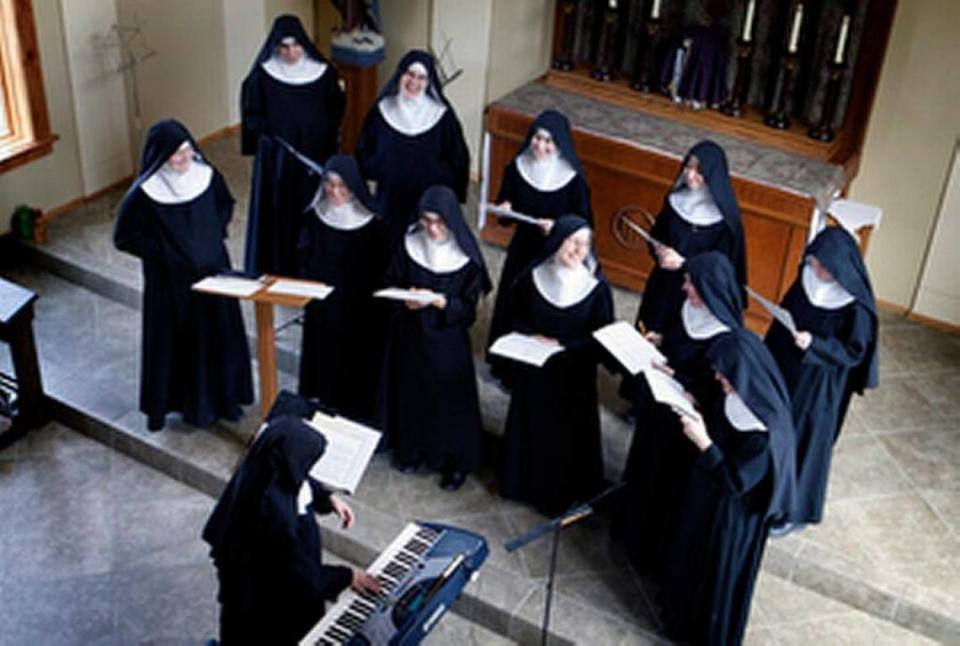Missouri nuns gained fame for founder’s exhumed body. They’re known for their music, too
- Oops!Something went wrong.Please try again later.
- Oops!Something went wrong.Please try again later.
Uniquely KC is a Star series exploring what makes Kansas City special. From our award-winning barbecue to rich Midwestern history, we’re exploring why KC is the “Paris of the Plains.”
When a singer hits the top of the charts, she’s usually rewarded with million-dollar contracts, private jets and stadiums full of adoring fans. But there are some chart-toppers in Gower, Missouri, who live lives of humility and for whom music is an act of worship.
The Benedictines of Mary, Queen of Apostles are making waves in the classical music industry through their bestselling recordings of Gregorian chant, a serene, centuries-old music that has found a large and receptive audience in our current Age of Anxiety.
The nuns’ tale begins with one sister, a descendant of enslaved people, who left the Oblate Sisters of Providence, an order of Black nuns in Pennsylvania, to start her own, more contemplative order.
“We were founded in 1995 by Sister Wilhelmina Lancaster, who has gained just a bit of fame in the past year through her incorrupt body and habit,” Mother Abbess Cecilia, prioress of the Gower community, said in an email interview.
Wilhelmina died in 2019 at the age of 95. Her body, which was not embalmed, was buried in a wooden coffin. Last year the sisters decided to relocate her body to inside their monastery chapel, a custom for founders. The body and habit were found “in a remarkable preserved condition,” the nuns said at the time.
Wilhelmina now lies in a glass coffin at the church and has been attracting thousands of devout pilgrims ever since.
Though Wilhelmina had founded the order in Pennsylvania, they moved in 2006 to a convent across the street from St. Pius X High School in the Northland, at the invitation of the Diocese of Kansas City-St. Joseph. When a couple donated land in Gower, about 50 miles north of downtown KC, the community moved there in 2010.

The nuns follow the monastic rule of St. Benedict, the heart of which is “Ora et Labora,” pray and work. Besides the cleaning, gardening, cooking and the making of vestments, all of which is carried on in silence, the sisters also come together at regular times throughout the day to chant.
“Music has been a part of our charism from our beginnings, and Sister Wilhelmina was quite insistent upon this,” Cecilia said. “Sacred music has been at the heart of Benedictine life for centuries, with the chanting of God’s praises in the Divine Office.”
The simplicity of the nuns’ way of life is reflected in the austerity of Gregorian chant, which is also known as plainchant. Evolving from the temple chants of ancient Jerusalem, Gregorian chant was codified by the person after whom it’s named, Pope Gregory, in the late 6th and early 7th centuries.
Something about this ancient music resonates with audiences in our overly complicated times. Perhaps it’s the same spirit that has driven the popularity of minimalism. Gregorian chant, as Marie Kondo might say, “sparks joy.” Witness the phenomenal success of “Chant,” the album by the Benedictine Monks of Santo Domingo that reached number three on the Billboard200 chart in 1994, selling 4 million copies worldwide, 2 million of those in the United States.

The Benedictine nuns of Gower had a similar success in 2012 with their first recording, “Advent at Ephesus,” which reached number two on Billboard’s Classical Traditional Music Chart. Their second album, “Angels and Saints at Ephesus,” hit number one on in 2013 and stayed there for 13 weeks.
“I have to say, the popularity of the CDs has been something of a mystery to us,” Cecilia said. “But it seems people somehow hear the love of God that we hold in our hearts in our music. The chants and the hymns are ordered and peaceful, a recipe for beauty. And people are thirsting for beauty.”
Cecilia explains that that thirst for beauty is also behind their celebration of the Traditional Latin Mass. Codified by the Council of Trent in 1570, its origins are much older. This liturgy, in which the priest and congregation face east together, was celebrated by Roman Catholics until the Mass of Paul VI was introduced in 1969 and the Traditional Latin Mass was greatly restricted.
In 2007, Pope Benedict XVI loosened those restrictions, resulting in a boom for traditionalist parishes. Kansas City has one diocesan church devoted to the Traditional Latin Mass, Old St. Patrick Oratory, and the Archdiocese of Kansas City in Kansas has St. Rose Philippine Duchesne. In addition there’s St. Vincent de Paul, a member of the Society of St. Pius X, which is considered canonically irregular by the Vatican.
Pope Francis issued an apostolic letter in 2019 that once again tightly restricted the Traditional Latin Mass, supposedly to foster unity. But traditionalist parishes continue to thrive and are well-attended, attracting many young people and families. Kansas City Chiefs kicker Harrison Butker,, for example, is a well-known devotee of the Traditional Latin Mass.

“When I went to the traditional Mass for the first time, I was overwhelmed, but in a good way,” Cecilia said. “I think that young people are attracted to the Latin Mass not only because it is different, different from everything they have experienced, but I think they also see logically that there has been a falling off in Mass attendance over the last century, and that points to something having gone wrong.”
Cecilia says that her order of nuns has seen a remarkable growth in vocations. As a matter of fact, they are currently fundraising to build a satellite monastery in Ava, Missouri, in the Ozarks.
“Our average age is 35, and our 67 sisters come from a generation that feels the need to treasure and honor the mysteries and graces that have been built up over centuries before the 20th,” she said.
There are also more albums in the works. The nuns have just finished editing two albums, one celebrating the martyrs and another in honor of their founder, Sister Wilhelmina. That album will include two of her favorite African American spirituals, “Deep River” and “Joshua Fit the Battle of Jericho.”

Cecilia, who leads the choir, received her name when she received the Benedictine habit, and one can’t think of a more fitting appellation, St. Cecilia being the patron saint of music.
“St. Cecilia has really been a tremendous guide for me since I was young,” she said. “I turned to her especially when I took up the French horn at the age of 9, studying music at Rice University and winning a job with the Columbus Symphony Orchestra when I was 22. Though I don’t play much horn anymore, the Lord has seen fit to continue on with this apostolate of music in my life. There’s no doubt St. Cecilia continues to assist and intercede for me and the community.”
For more information, benedictinesofmary.org.
Harriman-Jewell Series — Step Afrika!
The Harriman-Jewell Series is bringing some exciting dance to the Folly Theater on April 5. Step Afrika!, as its name implies, specializes in stepping, a dance form that originated and still thrives at Black fraternities and sororities. Step Africa! has brought this original American dance style to over 60 countries, and thanks to Harriman-Jewell, Kansas City will get a chance to experience it.
7 p.m. April 5. Folly Theater, 300 W. 12th St. $12.50-$90. 816-415-5025 or hjseries.org.
Harriman-Jewell Series- Emanuel Ax
The Harriman-Jewell Series has another big program in the offing: a recital by pianist Emanuel Ax April 7 at the Folly. Ax, a Kansas City favorite, will perform a meaty program of Beethoven and Schoenberg. In addition to two of Beethoven’s most popular sonatas, the “Pathétique” and the “Appassionata,” the program will include works by the bad boy of New Viennese music, which, unfortunately, are rarely heard in concert.
3 p.m. April 7. Folly Theater. $12.50-$90. 816-415-5025 or hjseries.org.
You can reach Patrick Neas at patrickneas@kcartsbeat.com and follow his Facebook page, KC Arts Beat, at www.facebook.com/kcartsbeat.

